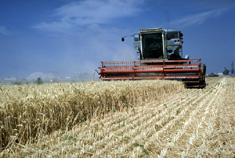
China's farmers and farm produce companies should prepare themselves for stricter rules on food exports soon to be imposed by Japan and the European Union if they want to continue exporting to the two economies, said the Ministry of Commerce.
The new rules could potentially weaken the competitiveness of China's agricultural exports, an official from the Ministry's Foreign Trade Department said yesterday.
"The new rules will limit our access to Japan and EU markets. For Chinese agricultural product providers, they (the rules) are very complicated," he said.
Japan is imposing rules on levels and types of residues, such as pesticides and chemical sprays, found on treated foods. It will implement a "positive list" system from May 2006 for agricultural chemical residues, in particular on pesticides. The system is designed to prohibit the sale of foods carrying high levels of agricultural chemical residues, by setting maximum residue limits.
Once the new requirements take effect, many residues found on treated foods that have been previously evaluated for health and safety, and passed by regulatory systems throughout the world, will no longer be allowed in Japan.
"China's vegetable and tea exports to Japan will be hardest hit by the new residue rules," the official said.
The EU rules apply to the safety standards of food products of animal origin, and are part of the region's ongoing reform of food safety laws. It has said documents will have to accompany all imported food products of animal origin and must show detailed information on the entire food chain of that product, filled out by each food business operator involved along the food chain.
In addition, the EU will implement legislation relating to animal feed standards on January 1.
Agricultural experts said the most radical feature of the new EU regulations is the measures which will be imposed on European importers who do not comply with the new rules. Consequently, there are high operational requirements for Chinese agricultural exporters where care and attention must be taken at every stage of the food chain of exported animal food products.
"Beginning next year, the Ministry will carry out training in main farming areas to help farmers adjust to the new rules," the official from the ministry's foreign trade department said.
China's agricultural product exports have maintained growth despite facing severe challenges from increasing foreign technical standards.
China's exports of farm products rose 23 percent year-on-year to US$19.6 billion in the first nine months of this year.
Japan and the EU are China's top two agricultural export regions, with Japan accounting for one third of China's farm produce exports and the EU market representing more than 10 percent.
Chinese farmers have paid a heavy price for high foreign technical standards.
In early 2002, the EU began to ban imports of Chinese foods of animal origin, plus seafood and other aquatic products, although this ban was lifted two years later.
It resulted in a 70 percent slump in China's aquatic product exports in the second half of 2002.
(China Daily November 29, 2005)
|

